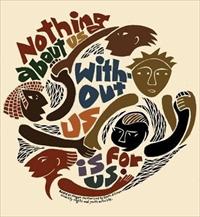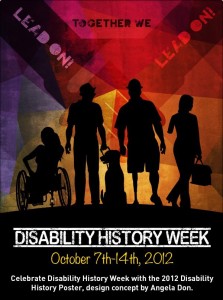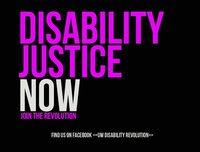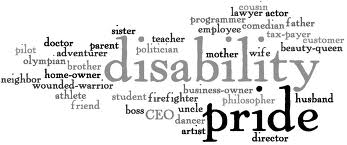If You Don’t Provide Accessibility, Your Message is “You Don’t Matter”
You never know when a lack of accessibility — and the message that you are not important enough for someone to provide it — is about to hit you in the face.
Case in point: On Sunday, I was having a lovely day, minding my own business, working out, studying ASL, writing my thesis, and otherwise enjoying the serenity of a rainy, overcast afternoon. In the evening, my husband told me about a conversation he’d had with one of his relatives that day. She had called him to apologize for not showing up to various important events in our lives. And from there, the day derailed into grief and utter frustration.
The conversation had begun well. She’d apologized. He’d thanked her for her apology. Everybody was happy. And then she said, “And tell Rachel I apologize, too.”
My husband, being a kind and thoughtful man, knows better than to accept a second-hand apology on anyone’s behalf. So he told his relative to apologize to me directly. She asked if he’d put me on the phone. I wasn’t there, and my husband mentioned to her that the phone doesn’t work for me. He really need not have mentioned it. She knows about my audiological issues. She knows how bad my hearing is when it comes to degraded sound on the telephone. She knows how exhausting it is for me to use the phone at all. She knows that I communicate in text when I am not standing face-to-face with someone. She knows all of this. I told her directly when she called me a few years back.
So my husband asked her to email me. Her response? “No, that’s not going to work for me.”
Why? Because she would have to walk up two flights of stairs to the computer.
I kid you not.
This is a person who has emailed me in the past. This is a person with all of her fingers, who is perfectly capable of climbing stairs, and who was simply refusing to use my best and most comfortable means of communication in order to make an apology I could take in without getting a headache. In other words, if she couldn’t use the telephone to make an apology for ignoring me and failing to show up, she was just going to … ignore me and fail to show up.
This situation has hit me like a ton of bricks. It’s not just the lack of communication. It’s the message that my feelings, my dignity, and my personhood are not sufficiently valuable for someone to write me an email. How much more marginalized in the family could I possibly be? How much clearer could the message be that I am not valued, that I am not important, that I do not matter?
This is not the first time I have felt marginalized in the family. For many years, I reached out to everyone and, with only a few exceptions, got little in response. I sent emails that went unanswered. I sent around pictures of my kid’s soccer games and dances and other life events and got no response. I shared events from my life to the sound of crickets. I offered to be of support in various family crises, to no avail. Only two of Bob’s family members showed up to our wedding; only one showed up to my kid’s high school graduation. Except for Bob’s kids, no one ever came to visit us in our house in Brattleboro, even though they were traveling in the area and we had told them that they were welcome to stop by.
And yet, for years, whenever someone has contacted me, I followed up. I did not leave emails unanswered. Why would I? Having lost my own family, I was so hungry for contact from my husband’s family that there was no way I would have risked any of them thinking that the contact wasn’t important to me. There is no way I would have missed an opportunity to connect.
And what have my husband and I done together? We have traveled down the east coast countless times over the past ten years to see relatives. I can’t even keep track of how many times I’ve gotten in the car and gone to New York — with my multiple disabilities, my super-sensitive neurology, my PTSD, and all of the pain and fatigue that derive from them. I’ve gone to a wedding crowded with people in a small space, where I could barely hear what anyone was saying. I’ve gone to parties and shiva minyans in noisy venues. I’ve helped lead a baby naming ceremony. I’ve helped to care for my father-in-law while his body and mind were falling apart. I’ve gone out to restaurants with family members and was utterly exhausted from the sheer noise. I’ve gone down to New York to visit family in the midst of a hideous, eight-month-long withdrawal from benzos. I’ve gone way, way, way past my comfort zone in the service of connecting with them.
But someone can’t walk upstairs to send me an email? Because it’s too hard?
My 69-year-old husband flew 3000 miles last month to go to an anniversary party for his relatives, after a whole year of flying back east every month to care for his dad.
But someone can’t walk upstairs to send me an email? At my husband’s request?
It’s so absurd that it doesn’t even compute. My brain is almost on fire trying to grok it. I have to stretch and stretch and stretch to meet the demands of the able-bodied world, and I’ve done it for 55 years, and I’ve done it without any support from my original family. In fact, I’ve done it in the face of a legacy of protracted abuse and all that it does to the body and mind.
But someone can’t walk upstairs to send me an email? Because it’s too uncomfortable?
Could the nature of able-bodied privilege be any clearer? Could the message of “You don’t matter” be any more apparent?
I am absolutely beside myself.
© 2014 by Rachel Cohen-Rottenberg








Maria
2/4/2014 | 10:00 pm Permalink
Dear Rachel,
OMG your article gave me chills because is so similar to something that I’ve experienced.
Would it be possible to contact you privately?
This article made my night. Hope to hear from you soon.
Thank you for being the voice of so many who have experience the hurtful feeling of being ignored by many and in so many ways!
God bless you!
Maria
Elaine Axten
2/5/2014 | 2:26 am Permalink
I hear you.
People I have known for years are the worst because their constant misunderstanding hurts more than a stranger’s.
A few years ago I got involved with a Buddhist organization. A lack of understanding there was also extra hurtful, since they pride themselves on mindfulness.
I understand you wanting to cultivate relationships within your family, but they are not the only game in town. Like me, you have probably discovered the internet is a good place to meet other spoonies as well as people who simply accept you as you are.
Jo
2/5/2014 | 9:55 am Permalink
I agree – the message sent due to a lack of accessibility is clear to me. Many try to say – oh they jut haven’t thought of that yet – or they haven’t gotten around to it yet – I say BS! Another thing that really bothers me is awards for accessibility – puhlease! This concept should not exist – it’s not about getting an award for crying out loud!
Kelsey
2/5/2014 | 3:16 pm Permalink
Your relatives and their absolute lack of understanding of their privilege is so …disappointing. They seem to generally not make the effort to stay in touch, but that “that’s not gonna work for me” attitude is well beyond unfortunate.
I just thought I would mention though, if you do want to use your voice to communicate with people through the phone, you do have a couple options to make it less frustrating on your part.
One option is using a telephone captioning service, that types out the text of what the other person is saying while you speak to them.
https://www.captioncall.com/captioncall
The second option you have, and may have learned about while learning ASL, is to use a Video Relay Service (VRS). You would then be face to face, through your internet connection, with an ASL/English interpreter. While you can sign for yourself, you also have the option to use VCO (Voice Carry Over) with VRS where you speak for yourself, the hearing person can hear you. When the hearing person talks though, the interpreter will sign/mouth the words that the hearing person is saying. I don’t know how fluent you are yet in ASL, but that is another option. If you lipread well, you don’t really have to sign well to take advantage of the service.
Maybe you already know about these options and choose not to use them. Just thought I’d put the options out there as information is power.
Maria
2/8/2014 | 7:32 pm Permalink
When there’s a will, there’s a way! Very simple!!
Aaron Medel
2/19/2014 | 8:26 pm Permalink
Mrs. Rottenberg,
I just read ” If You Don’t Don’t Provide Accessibility Your Message is You Dont Matter” and honestly, sitting here in shock. Your experience, words,and yes that damm phone thing. I need to read it again.
Aaron Medel
2/19/2014 | 8:27 pm Permalink
You see! Can’t even type right after reading that
Ivy
2/21/2014 | 6:09 pm Permalink
i have found my favorite new blogger! thank you for creating this site.
Vlad Drăculea
2/21/2014 | 10:56 pm Permalink
Wow, it just floors me that she wouldn’t make the effort! When I feel the urge to make an apology, I nearly always make darn sure that I’m communicating in a way that works for the person I’m talking or e-mailing with. I would have thought that would be obvious to most neurotypical people if it’s obvious to an Autistic person like me. On the other hand, my neurotypical mother has made this kind of social blunder with me and other disabled people on numerous occasions.
My Autistic dad is the one who wouldn’t make this kind of mistake. In fact, over the past year, since re-connecting with other Autistics, my social skills have improved at a much higher rate, simply because people in our community really seem to *care* about this kind of thing and are very articulate in the blogosphere and in conversations in groups/time-line posts on facebook and other social media about how to respect others.
(By the way, I’m not saying this is a problem with all neurotypical people, since such generalizations are fraught with fail, and furthermore I know many wonderful, compassionate, and loving neurotypical people. I just find it ironic that some of the most compassionate people I know happen to be fellow Autistics, while some of the most insensitive people I know happen to be neurotypical people.)